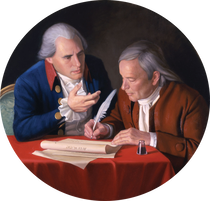January 2019 Newsletter
|
When Compromise Was NOT a Dirty Word
To many Americans, the word “compromise” has become synonymous with the word “lose.” Historically speaking, this line of thinking is new. In fact, without our Founding Fathers’ willingness to embrace compromise and all it entails—openness and respect for another’s viewpoint, willingness to make concessions toward a shared, common goal, and a deep understanding that an “all or nothing” mindset threatens everyone’s interests—our government would not exist, as we know it.
PICTURE THIS: It’s a sweltering Philadelphia summer in 1787, and 55 men in full dress and periwigs are crammed into the old Pennsylvania State House to frame a newer, stronger United States government. As they had determined, early on, to keep the meetings private, the windows are nailed shut, the doors closed against the breeze outside, and temperatures, tensions and tempers are high. The larger states propose the Virginia Plan, a bicameral legislature, with membership in both houses allocated to each state proportional to its population. The smaller states put forth the New Jersey Plan, arguing for a single house legislature with each state represented equally within its body.
Nobody can agree. The larger states defend their position, stating because they contribute proportionally more to the nation’s defensive and financial resources, they are entitled to proportionally greater representation in its legislature. The smaller states argue the perpetual union originally envisioned only functions when each state is given equal voice. As the weeks pass, the debates devolve into arguments. Alexander Hamilton accuses the small states of seeking “power, not liberty,” and Gunning Bedford, Jr. famously threatens on behalf of the small states to, “find some foreign ally of more honor and good faith...” Delegates from both sides vow to reject any document that does not give them their way. And this is where the story turns. Into this deadlock, Roger Sherman and Oliver Ellsworth propose what is now known as the Great Compromise—essentially, a marriage of the Virginia (large state) and New Jersey (small state) Plans—which would establish a dual system comprised of both proportional and equal state representation. At first, the delegates are uncertain, and most are inclined to pass on the idea. Then, elder statesman, Ben Franklin, rises to give them a simple story with a new perspective. “When a broad table is to be made,” he says, “and the edges of the planks do not fit, the artist takes a little from both and makes a good joint. In like manner here, both sides must part with some of their demands, in order that they may join in some accommodating proposition.” Soon, both sides agree, and the angry stalemate that threatened to derail the writing of the United States Constitution dissolves into a productive union, working together to frame our government as we know it. We take this governmental structure for granted, now, but for our Constitutional Framers, it required enormous cooperation and a willingness to focus on the common goal—a strong, functional United States government—over each side’s independent desires. We can learn a lot from this example. The workplace is shifting. More often than not, advancement and change within corporate structure is team driven. As leaders, it is extremely important for us to lead others toward shared, core goals, and also help our teams resolve problems arising from different perspectives without destructive conflict. We don’t have all the answers, but if we lead with open minds and open ears, we can create forward change. How do you begin to guide your team toward compromise? First, listen to all sides, then use simple metaphors to give perspective, and share these examples from successful leaders. Ronald Reagan told his aides on many occasions, “I’d rather get 80 percent of what I want than go over the cliff with my flag flying,” and Lin Manuel Miranda, summing up compromise in one of the most-loved pieces from Hamilton, wrote: The Connecticut Compromise / Bradley Stevens / 2006 / U.S. Senate Collection
Two Virginians and an immigrant walk into a room
Diametrically opposed – Foes! They emerge with a compromise Having opened doors that were previously closed – Bros! OUR LESSON:
Let’s not be so determined to be right that we miss an opportunity to be successful. |
|

